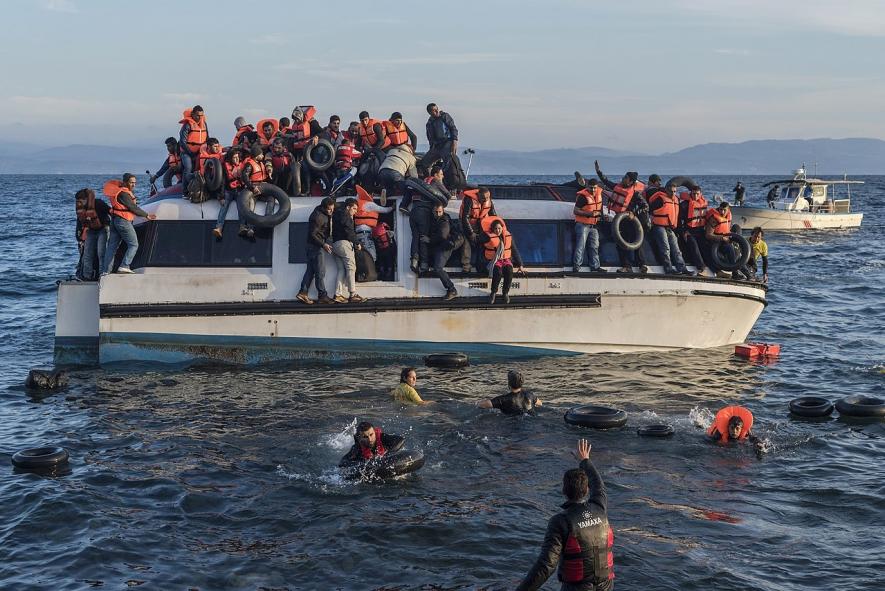EU’s Solution to ‘Refugee Crisis’ Involves Outsourcing Responsibilities

In the last week of June, political developments within Germany and the recent resurgence of the right in many countries in the continent led to migration taking the centre-stage at the European Summit meeting on June 28-29. The resulting agreement, more an attempt at mediating between the domestic compulsions of European powers rather than addressing the issue concretely, saw the onus being placed further on countries on the borders of Europe. This strategy has its own risks, analysts have pointed out.
This is even as the number of asylum applications made in the EU has declined from the peak of 1,322,800 in 2015 to 704,600 last year. In first quarter of this year, the number of first-time asylum applications further declined by 25% as compared to last year's first quarter, amounting to a mere 257 applications per million inhabitants in the EU.
The sharpest decline in such border crossings can been seen from 2016 onwards, the year since when the EU has been outsourcing the task of stopping migrants to countries which serve as crucial transit points, such as Turkey and Libya. The violence used in the process of cracking down on refugees in such countries does not make media headlines.
Figures indicate that the refugee flow in the EU, which the union calls the “refugee crisis”, is at its lowest in the last three-and-a-half years, in the course of which there has been a 95% decline in irregular border crossings into the EU by refugees fleeing wars and violence in their countries that have been destabilized by Western intervention, in which various EU member states have played a crucial part.
Read More: Hundreds of Thousands Protest Trump’s Anti-Immigrant Policies
However, the domestic political crisis in Germany - where Angela Merkel’s coalition partner threatened the collapse of the government if stronger laws were not introduced and implemented to curb the inflow of migrants - led to the issue gaining unprecedented urgency ahead of the summit.
On the first day of the summit, the new populist right-wing government of Italy flexed its muscles, blocking all the joint decisions at the summit, including those on issues over which there appeared to be a consensus between member states. This was even before the discussion over migration that was scheduled over dinner that night.
It was clear that Italy was concerned that the discussions would not focus on the needs on the frontline states - where immigrants first enter Europe - but on their secondary movements, which is what led to disputes in Germany. This concern led it to virtually hold the summit at ransom, ensuring no progress could be made until the issues raised by it were addressed.
The press conference scheduled for later in the evening to present the agreements reached on that day had to be cancelled.
Finally, after a nine-hour long negotiation, in the course of which European Council President Donald Tusk presented multiple versions of the migration policy draft - which were discussed upon and rejected by France, Italy and the Visegrad group which includes Hungary, Poland, Slovakia and Czech Republic - an agreement was reached around 5 a.m.
With Italy insisting that the burden of hosting irregular migrants arriving at its shores must be shared, and Central European countries like Hungary and Czech Republic refusing any proposal of alloting quotas to member states in order to host migrants, the final agreement stipulated that those migrants rescued in EU waters, “should be taken charge of, on the basis of a shared effort, through the transfer in controlled centres set up in Member States, only on a voluntary basis..”
The EU would provide full support to members states which set up such control centres to undertake a “rapid and secure processing” in order to “distinguish between irregular migrants, who will be returned, and those in need of international protection, for whom the principle of solidarity would apply.”
However, the agreement - which calls on member states to share the task of setting up control centres, relocating and resettling the migrants on a "voluntary basis" - provides no information on what measures will be taken if a majority of the member states refuse to volunteer.
Strong anti-immigrant sentiments prevail in Italy, contributing to the wave on which a coalition partner in the current government rode to power. Meanwhile, Merkel was able to avert a government collapse in the last moment only by conceding the CSU’s demand for stronger measures to stop the entry of immigrants into the country. At the same time, the Central European countries are ruled by leaders who are rabidly anti-immigrant. In such a situation, it is unlikely that sufficient countries will volunteer to undertake the proposed measures.
The agreement also urges the EU countries to take “all necessary internal legislative and administrative measures” to curtail “secondary movements of asylum seekers between Member States”, i.e the movement from the country in which they first arrive in the EU to the country in which they intend to apply for asylum.
In the first quarter of this year, 34,400 or 26% of all the first-time asylum seekers made their applications in Germany, making it the destination where the highest number of asylum applications were filed. However, in terms of proportion to the country’s population, Germany, the largest economy in EU, had only 418 first time asylum applicants per million inhabitants in the country, which is higher than the EU average of 257 applicants per million, but significantly lower than 1,550 applications per million in Cyprus, 1,204 in Greece, 858 in Malta and 753 in Luxembourg. Nevertheless, 60% of the applications were rejected by Germany.
Read More: As European Powers Squabble, Migrants Struggle to Stay Afloat
As more and more countries take measures to close their borders to asylum seekers who are moving from one EU member state to another, pressure on frontline EU countries such as Italy and Greece is set to increase - an increase which is unlikely to be offset by ‘voluntary’ contributions of other member states. Nonetheless, Italian Prime Minister Giuseppe Conte said after the conclusion of the summit that Italy was “no longer alone”.
Recently, Italy was roundly criticised for not allowing a ship which had rescued drowning migrants to dock at its ports, leaving them stranded in perilous seas for days. The agreement envisions no concrete measures to avoid such incidents, but only calls upon the European Council and Commission “to swiftly explore the concept of regional disembarkation platforms” where migrants rescued in the sea can be disembarked from ships.
To outsource the dirty job
The more concrete measures outlined in the agreement focus not on addressing the issues faced by the migrants once they are in EU countries but on stopping them from being able to reach the EU, by paying money to countries outside the union. These include countries in Africa and the Middle East, where migrants can be stopped from crossing borders by use of force in violation of human rights and international law.
In order to choke the Eastern Mediterranean Route which Syrians have been taking to escape from the war, the agreement stresses on the need to “fully implement the EU-Turkey Statement, prevent new crossings from Turkey and bring the flows to a halt."
“Syrian refugees attempting to cross into Turkey at unofficial crossing points are summarily pushed back into Syria and some asylum seekers and smugglers attempting the crossing have been shot dead or beaten by Turkish border guards,” a Human Rights Watch (HRW) report on Turkey stated last year.
This, however, was not the way Turkey had always been dealing with the refugee crisis. HRW’s 2015 report on Turkey stated: “A new asylum law, which went into effect in April 2014, for the first time, enshrines asylum and subsidiary protection as a matter of law, including provisions for legal aid, on unaccompanied children and on non-refoulement. It limits administrative detention of migrants pending deportation to six months (extended for another six months for noncooperation) with the stipulation that detention ordinarily should not be used for asylum seekers.” What followed was a series of diplomatic maneuvers by the EU and Turkey over the issue of migration.
The year Turkey passed the law, it was pulled up by the European Commission, which, in its annual report, expressed “serious concerns” about the government's interference in the country's judiciary and its crackdown on internet freedom. Multiple rulings were passed by the European Court of Human Rights against Turkey in 2014 after its new asylum law was put into effect. Turkey’s attempts to accede to the EU saw no progress.
The month after the new asylum law was introduced, the EU signed an agreement with Turkey which allowed the former to deport unauthorized Turkish citizens living in the EU back to Turkey. From 2017, the agreement allowed the EU to also deport to Turkey other irregular migrants who enter the EU through through the country.
By 2015, when Turkey emerged as the main transit route through which an increasing number of refugees arrived in Greece, the EU struck a deal with Turkey, requiring the latter to cub the flow of refugees into EU, in exchange for 3 billion euros, “the prospect of visa-free travel for its citizens in most EU countries and reinvigorated talks on EU membership,” HRW's 2016 report pointed out.
Months after the deal was struck, in October that year, the European Commission President, urged the European parliament to stop raising issues regarding human rights violation in Turkey. “We face two possibilities. We can say that EU and the European institutions have outstanding issues with Turkey on human rights, press freedoms and so on.. We can harp on about that but where is that going to take us in our discussions with Turkey?”, he told the parliament, adding, “We know that there are shortcomings but we need to involve Turkey in our initiatives. We want to ensure that no more refugees come from Turkey into the European Union.”
The publication of European Commission's annual report on human rights in Turkey was postponed until after the general elections were complete in November 2015, days after which summit meetings between EU and Turkey began, eventually culminating in the EU-Turkey statement on March 18 the following year.
In this statement - whose full implementation is called for by the agreement reached in the European Council meeting this year - the two parties declared that “the EU and Turkey today decided to end the irregular migration from Turkey to the EU.”
In order to do so, “Turkey will take any necessary measures to prevent new sea or land routes for illegal migration opening from Turkey to the EU, and will cooperate with neighbouring states as well as the EU to this effect,” and the EU, on its part, will deport back to Turkey all “new irregular migrants crossing from Turkey into Greek islands as from 20 March 2016”.
Since then, Turkey has imposed restrictions on the Syrian border to deny access to refugees, and has pushed thousands of asylum seekers, illegally crossing the border, back into the war-torn country from where they were escaping. Over the last three years, the number of refugees arriving in Europe through the Eastern Mediterranean Route has witnessed a 97% decline.
In the European Summit meeting, Merkel thanked Turkey for its role, and said, “We would all agree Turkey is doing a tremendous job.” The European Council has agreed to provide Turkey an additional 3 billion euros as a part of honouring the commitments made in the EU-Turkey statement, ostensibly to finance a “Facility for Refugees”.
Turkey is not the only country outside the EU to whom the task of curbing the flow of refugees has been outsourced. The EU has so far committed 237 million euros to Libya to rein in the flow of refugees. In February last year, EU leaders agreed to further train and equip the Libyan Coastguard. The agreement stipulates that the EU “will step up its support” for the Libyan Coastguard in order to choke the Central Mediterranean Route that those escaping from the political and economic turmoil in Sub-Saharan and North Africa take to enter Europe, mostly to Italy first, through Libya as the transit point.
Trained and equipped by EU, the “Libyan Coast Guards or Navy intercepted boats and returned the migrants and refugees back to land and into detention centers, often subjecting the migrants they intercepted to physical and verbal abuse.. Officials and militias held migrants and refugees in prolonged detention without judicial review and subjected them to poor conditions, including overcrowding and insufficient food. Guards and militia members subjected migrants and refugees to beatings, forced labor, and sexual violence,” HRW’s 2017 report stated.
The June 29 agreement of this year called upon vessels of EU member states plying the Mediterranean to “not obstruct operations of the Libyan Coastguard.” Other countries in the Sahel region of Africa will also receive additional support from the EU to crack down on the migrant flow.
Outsourcing the task of stopping refugees to countries where human rights violations committed in the process largely remains under the radar, is a policy that been tried and tested by the EU, and has successfully helped in reducing the irregular border crossing into the union by 95% since the October 2015 peak, as acknowledged in the agreement.
By promising to increase support for countries outside the union that are tasked with stopping the migrants from escaping war-torn countries into Europe, the EU is likely further reduce the flow of refugees in the region, by denying them an escape from the violence and anarchy that many countries in the region have been plunged into.
Get the latest reports & analysis with people's perspective on Protests, movements & deep analytical videos, discussions of the current affairs in your Telegram app. Subscribe to NewsClick's Telegram channel & get Real-Time updates on stories, as they get published on our website.























